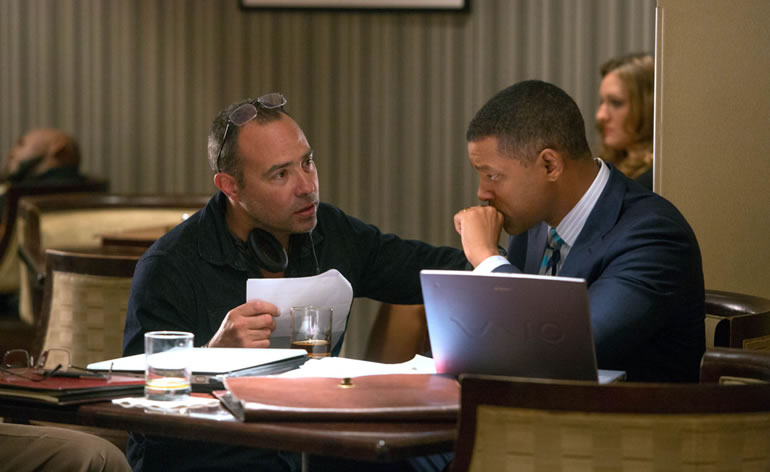 About the Author: Scott Essman established Visionary Cinema in New York in 1989, moving to Los Angeles in 1995. In 2008, he won a Rondo Award for Best Feature Film Commentary for work on the Legacy Set of Universal’s The Mummy (1932 version). His filmography includes more than 28 productions including Jack Pierce: The Man Behind the Monsters, Ten Men on the Field, and Trane and Miles. Essman has published over 500 articles about people who work behind-the-scenes in movies. He teaches mass media, filmmaking, and digital video editing at the University of La Verne, The Art Institute of California, and California Polytechnic State University, Pomona.
About the Author: Scott Essman established Visionary Cinema in New York in 1989, moving to Los Angeles in 1995. In 2008, he won a Rondo Award for Best Feature Film Commentary for work on the Legacy Set of Universal’s The Mummy (1932 version). His filmography includes more than 28 productions including Jack Pierce: The Man Behind the Monsters, Ten Men on the Field, and Trane and Miles. Essman has published over 500 articles about people who work behind-the-scenes in movies. He teaches mass media, filmmaking, and digital video editing at the University of La Verne, The Art Institute of California, and California Polytechnic State University, Pomona.
In crafting the film Concussion, concerning National Football League players who have contracted permanent brain damage, technically called CTE (chronic traumatic encephalopathy), writer-director Peter Landesman aimed the project at a mainstream theatrical release, one which was advertised during major sporting events. That audacious move against one of America’s most prominent institutions might have raised eyebrows in both NFL and Hollywood circles, but not Landesman’s as he unveiled in an exclusive interview.

“I made the movie for everybody, including football fans,” he related by phone after the film’s initial wide theatrical run, an exhibition pattern suited to a project such as Dead Pool more obviously than a film about an actual African neuropathologist named Bennet Omalu (boldly played Will Smith) who discovers in several autopsies the similar strains of brain damage attained by a group of former NFL players. “I never felt the footsteps of anybody behind me. The best defense is the truth. We were making an honest feature film. I was never worried about anybody else.”
Based on a Gentleman’s Quarterly magazine article entitled “Game Brain” by Jeanne Marie Laskas, Concussion’s screenplay was developed after Landesman’s own meticulous pre-production research commenced. “The article was a jumping-off point,” Landesman explained, noting that he utilized almost all of the article’s findings but delved further into his own findings. “I wanted to be very careful—I knew it would be gone through with a fine-tooth comb. I’m an ex-journalist.”
As with any feature film, 100% accuracy is a near impossibility, and Landesman related how Concussion was ultimately delivered in a dramatically liberal context, though it sticks to real people, events, and situations. “It’s a movie with characters, dialogue, emotion; it’s not a documentary,” he said. “It’s not a Wikipedia entry—it’s a movie. This one was very accurate.”
Though the implications of a large measure of NFL players suffering from CTE could result in a dethroning of the NFL’s longtime dominance, the people close to the matter who Landesman approached were open with information. “People wanted to talk about this,” Landesman noted. “They knew that it was a serious issue.”
Naturally, Landesman contacted Bennet Omalu, whose medical discoveries caused expected controversy in pro football circles. “I met the real guy,” Landesman revealed. “I spent a lot of time with him, researching him, [learning] a lot about his spirituality, real motivations. What is was like to become a pariah? How did he handle that?”
After Landesman’s screenplay was locked, he engaged Smith and the other lead actors in extensive rehearsals. “We worked for months on his accent and on his reading,” Landesman said of Smith. “ We both believe in over-preparedness.”
On set in Pittsburgh for 56 days, Landesman recalled that Concussion was not a technically complex shoot though his results were finally magnetic and powerful. “I love actors and getting in the trenches with them,” he said. “Being in the mud with them; a situation in which they feel safe to take chances.”
In addition the honesty communicated in Smith’s performance, so rich a dramatization that an Oscar nomination seemed a shoe-in—though it did not happen—Concussion features strong outings by Alec Baldwin as a NFL team doctor and a mesmerizing David Morse as Pittsburgh Steelers’ famous center Mike Webster who died at a young age and was found to have CTE. “Morse is enormously well-prepared,” said Landesman. “We had many conversations on and off set: how to find a man who is heroic and strong, coming apart at the seams at the same.”
Interacting with all of his actors, Landesman noted that his goals were simple and straightforward. “Just trying to find the most raw honest performance,” he said. “This was not complicated logistically; getting to the most honest, powerful, consistent performance we could find.”
As Landesman’s final film reads as some manner of indictment of regular NFL practices, one might have expected that director would have had his reputation and credentials questioned, just as the Omalu character is smeared by the powers-that-be in the film, but Landesman asserted that no interference was present during filming or post-production. “I never felt any concerns,” he detailed. “I don’t think it’s possible to go too far. The truth is the only thing that matters. The consequences are the consequences.”
With Concussion wrapped and in general release, Landesman noted that he was next preparing a film called Self with Liam Neeson. “I think that Concussion provided a stage and I’m going to exploit that moving forward,” he concluded. “Tell the stories that matter the most to me.”




